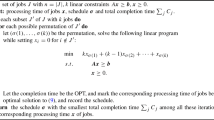Abstract
We address the two-machine flow-shop scheduling problem with time delays in order to minimize the makespan, i.e., the maximum completion time. We present a comprehensive theoretical analysis of the different lower bounds of the state of the art and we elucidate dominance relationships between them. We then introduce an exact method based on a branch-and-bound scheme. This method includes a local search-based heuristic and three dominance rules. Finally, a computer simulation of the branch-and-bound method is given on a set of 480 instances. We point out the good performance of our branch-and-bound method that outperforms the state of the art exact method. Precisely, we manage to solve all the state of the art instances except one in a very short time.









Similar content being viewed by others
References
Allahverdi, A., Gupta, J. N. D., & Aldowaisan, T. (1999). A review of scheduling research involving setup considerations. Omega, 27(2), 219–239.
Allahverdi, A., Ng, C. T., Cheng, T. C. E., & Kovalyov, M. Y. (2008). A survey of scheduling problems with setup times or costs. European Journal of Operational Research, 187(3), 985–1032.
Carlier, J., & Pinson, E. (1990). A practical use of jackson’s preemptive schedule for solving the job shop problem. Annals of Operations Research, 26(1–4), 269–287.
Dell’Amico, M. (1996). Shop problems with two machines and time lags. Operations Research, 44(5), 777–787.
Dell’Amico, M., & Vaessens, R. J. M. (1996). Flow and open shop scheduling on two machines with transportation times and machine-independant processing times is NP-hard. Modena: Dipartimento di Economia politica, Università di Modena.
Dhouib, E., Teghem, J., & Loukil, T. (2018). Non-permutation flowshop scheduling problem with minimal and maximal time lags: Theoretical study and heuristic. Annals of Operations Research., 267, 101–134.
Emmons, H., & Vairaktarakis, G. (2013). Flow shop scheduling (Vol. 182). New York: Springer.
Fondrevelle, J., Oulamara, A., & Portmann, M. C. (2006). Permutation flowshop scheduling problems with maximal and minimal time lags. Computers & Operations Research, 33(6), 1540–1556.
Graham, R. L., Lawler, E. L., Lenstra, J. K., & Rinnooy Kan, A. H. G. (1979). Optimization and approximation in deterministic sequencing and scheduling: A survey. In E. L. Johnson, P. L. Hammer, & B. H. Korte (Eds.), Discrete optimization II. Annals of discrete mathematics (Vol. 5, pp. 287–326). Amsterdam: Elsevier.
Johnson, S. M. (1954). Optimal two- and three-stage production schedules with setup times included. Naval Research Logistics Quarterly, 1(1), 61–68.
Karuno, Y., & Nagamochi, H. (2003). A better approximation for the two-machine flowshop scheduling problem with time lags. In Proceedings of the 14th international symposium on algorithms and computation, ISAAC 2003, Kyoto, Japan, December 15–17, 2003 (pp. 309–318).
Mitten, L. G. (1959). Sequencing n jobs on two machines with arbitrary time lags. Management Science, 5(3), 293–298.
Mkadem, M. A., Moukrim, A., & Serairi, M. (2017, April). A branch-and-bound algorithm for the two-machine flow-shop problem with time delays. In 2017 4th International conference on control, decision and information technologies (CoDIT) (pp. 0690–0695).
Mkadem, M. A., Moukrim, A., & Serairi, M. (2018). Lower bounds for the two-machine flow shop problem with time delays. In A. Fink, A. Fügenschuh, & M. J. Geiger (Eds.), Operations research proceedings 2016: Selected papers of the annual international conference of the German Operations Research Society (GOR), Helmut Schmidt University Hamburg, Germany, August 30–September 2.
Moukrim, A., Rebaine, D., & Serairi, M. (2014). A branch and bound algorithm for the two-machine flowshop problem with unit-time operations and time delays. RAIRO-Operations Research, 48(2), 235–254.
Msakni, M. K., Khallouli, W., Al-Salem, M., & Ladhari, T. (2016). Minimizing the total completion time in a two-machine flowshop problem with time delays. Engineering Optimization, 48(7), 1164–1181.
Rayward-Smith, V. J., & Rebaine, D. (1996). Uet flow shop scheduling with delays. RAIRO-Theoretical Informatics and Applications, 30(1), 23–30.
Rebaine, D. (2005). Flow shop vs. permutation shop with time delays. Computers & Industrial Engineering, 48(2), 357–362.
Rossit, D. A., Tohm, F., & Frutos, M. (2018). The non-permutation flow-shop scheduling problem: A literature review. Omega, 77, 143–153.
Schiex, T., & Verfaillie, G. (1993, November). Nogood recording for static and dynamic constraint satisfaction problems. In Proceedings of 1993 IEEE conference on tools with Al (TAI-93) (pp. 48–55).
Yu, W. (1996). The two-machine flow shop problem and the one-machine total tardiness problem. PhD thesis, Eindhoven University of Technology, The Netherlands.
Yu, W., Hoogeveen, H., & Lenstra, J. K. (2004). Minimizing makespan in a two-machine flow shop with delays and unit-time operations is np-hard. Journal of Scheduling, 7(5), 333–348.
Acknowledgements
This work is carried out in the framework of the Labex MS2T, which was funded by the French Government, through the program Investments for the future managed by the National Agency for Research (Reference ANR-11-IDEX-0004-02). It is also partially supported by the ATHENA Project (ANR-13-BS02-0006-02).
Author information
Authors and Affiliations
Corresponding author
Rights and permissions
About this article
Cite this article
Mkadem, M.A., Moukrim, A. & Serairi, M. Exact method for the two-machine flow-shop problem with time delays. Ann Oper Res 298, 375–406 (2021). https://doi.org/10.1007/s10479-018-3082-x
Published:
Issue Date:
DOI: https://doi.org/10.1007/s10479-018-3082-x




